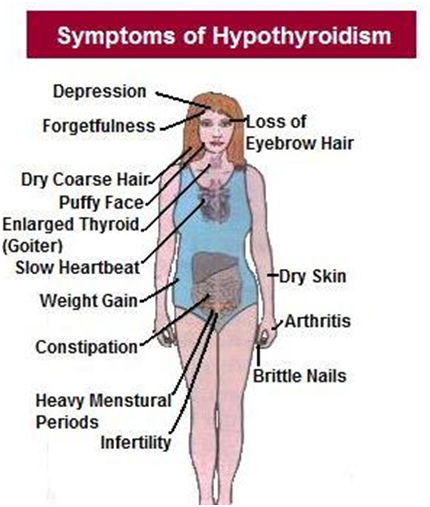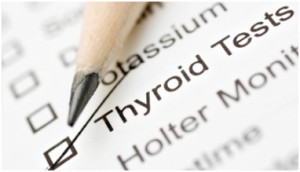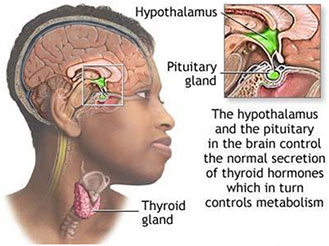Is Your Thyroid Making You Fat?: WHAT IS THE THYROID?
Is Your Thyroid Making You Fat?: The thyroid is a butterfly-shaped endocrine gland usually located in the lower front of the neck below the larynx. The thyroid’s job is to make thyroid hormones, which are secreted into our blood stream and then carried to all the tissue in the body. Thyroid hormone helps the body utilize the energy, stay warm and keep the brain, heart, muscles, and all other organs working as they should. The main hormone made by the thyroid is thyroxin, also called T4 because it contains four iodine molecules in its structure. Small amounts of another and more potent thyroid hormone containing three iodine molecules, triiodothyronine (T3) are also made by the thyroid gland, along with T4. However, most of the T3 in the blood is made from T4 in other tissues of our body. Thyroid hormones control the way all tissues in your body uses energy. They are essential to help each cell in your body’s tissue and organs work right. For example, thyroid hormone controls the body’s temperature, heart rate, blood pressure, and the rate at which food is turned into energy (metabolism).
WHAT IS HYPOTHYROIDISM?
Is Your Thyroid Making You Fat?: Hypothyroidism is a kind of thyroid disease. If you have hypothyroidism that means you have an underactive thyroid (“hypo-” means “under” or “below normal”). In people with hypothyroidism, the thyroid does not make enough thyroid hormone to keep the body running normally. Common causes of hypothyroidism are autoimmune disease, surgical removal of the thyroid, and radiation treatment. Fat upper arms thyroid. Low thyroid hormone levels cause the body’s functions to slow down, leading to general symptoms like dry skin, fatigue, loss of energy, and memory problems. hypothyroidism and weight gain. Hypothyroidism is diagnosed by a simple blood test for thyroid-stimulating hormone (TSH). Hypothyroidism is treated by replacing the missing thyroid hormone with synthetic thyroxin pills, which the person must take every day for life. With daily treatment, most patients recover completely.
COMMON SYMPTOMS
 Is Your Thyroid Making You Fat?: The body runs more slowly & has less energy, resulting gradual slowing down with loss of interest in normal daily activities. If you have any of these symptoms, Make sure you visit our Physician with Obesity Profile reports.
Is Your Thyroid Making You Fat?: The body runs more slowly & has less energy, resulting gradual slowing down with loss of interest in normal daily activities. If you have any of these symptoms, Make sure you visit our Physician with Obesity Profile reports.
- Weight gain – ( despite eating less) or Difficulty in losing weight or excess body fat
- Feeling tired all the time
- Forgetfulness
- Mood Swings
- constipation
- Intolerance of cold temperatures
- muscle aches
- heavy menstrual periods
YOU MAY HAVE OTHER SYMPTOMS:
- HAIR may be coarse, dry, or gray at a young age; brittleness of hair
- SKIN may become thick & dry; coarse & itchy skin
- Puffiness of eyes; Hand & Feet may be swollen. (Fluid Retention)
- Libido is Reduced (Loss of interest in sex)
- Voice may deepen or grow hoarse
- Sleep also gets disturbed leading to Insomnia & further more
BODY WEIGHT IS REGULATED BY THE THYROID
Is Your Thyroid Making You Fat?: The thyroid gland is the primary regulator of your body’s metabolism. If it does not function properly people can have weight loss as well as weight gaining issues. Weight loss isn’t possible when your metabolism is very slow. Fat upper arms thyroid. You feel fatigued, and your mind acts like it is in a fog. Most people do not realize how much thyroid imbalance can effect and change their quality of life. It plays a distinct role in maintaining body temperature, can adjust the metabolic rate of every cell, controls neurotransmitters in the brain altering your moods, appetite, behavior and emotions. When the thyroid isn’t doing its job, many people have significant hair loss, or feel cold even though it is warm. When emotions aren’t regulated the result is often depression, forgetfulness, irritability and weight loss problems. An underactive thyroid can’t regulate your body’s rate of metabolism and you become overweight, suffering with weight loss problems, even if you only eat a little food. If you have an underactive thyroid, without treatment weight loss seems hopeless.
WEIGHT REDUCTION WON’T HAPPEN UNTIL THE THYROID PROBLEM IS ADDRESSED
 Only recently scientists have determined that thyroid dysfunction has been the underlying cause of a wide range of diseases and conditions in addition to causing weight loss problems. Joint aches can result from a low thyroid and yet many people believe they have arthritis or are getting too old. And recent research confirms that even mild thyroid abnormality can make your fat loss increasingly difficult & stubborn.
Only recently scientists have determined that thyroid dysfunction has been the underlying cause of a wide range of diseases and conditions in addition to causing weight loss problems. Joint aches can result from a low thyroid and yet many people believe they have arthritis or are getting too old. And recent research confirms that even mild thyroid abnormality can make your fat loss increasingly difficult & stubborn.
HYPOTHYROIDISM & WEIGHT LOSS
Even while on medication, overweight people with hypothyroidism may experience difficulty with weight loss. In this case, close attention to diet and exercise – as well as maintaining correct medication dosage – should prove effective in helping to lose weight. Exercise is especially important for weight loss among hypothyroidism sufferers. Initially you may feel, that you don’t have the energy to do so, But gradually, as you lose the weight and the inflammation you will have more efficient energy reserves and distribution and you will turn this oppressive trend of downward spirals on its head and create a positive upward momentum towards weight loss and healing. But also make a note, that correcting the Hypothyroidism is only the first step for achieving your weight reduction goals. Only by correcting the hypothyroidism, you might lose only 10% of excess weight. For further weight/ body fat reduction it is advisable to take treatment in specialty obesity clinic. Also if you are looking for targeted fat reduction or spot reduction in areas such as abdomen, flanks, thighs, hips, arms, then along with the correction of your hypothyroid, it is recommended to undergo ultrasound cavitations for lipolysis & Narf for tightening the lose skin by neocollagenesis. The U-LipoTM treatment must be undergone by CE & ISO certified Effective, Powerful & Professional equipment.
 HOW DO I KNOW IF I HAVE HYPOTHYROIDISM?
HOW DO I KNOW IF I HAVE HYPOTHYROIDISM?
There are blood tests to measure theses hormones
- Free T3 ; Free T4 ; Ultra-sensitive TSH
- Thyroid Antibodies – AMA & ATG
HOW IS IT TREATED?
If you have hypothyroidism, your Thyroid Specialists will prescribe thyroid hormone tablets. Available in the Market as Brand names: – Tablets Eltroxin / Thyronorm & available in different strengths i.e. (25/50/75/150 mcg) depending on what dosages is required and with a regular 3 monthly checking of your Ultra-sensitive TSH Levels. What’s most important is that you start treatment right away and remember to take your pill every day – every day. Your doctor might prescribe that you take the same dose every day or different doses on different days. Following these instructions allows your doctor to accurately measure how your TSH is responding to treatment. Thyroxin replaces the hormone that your thyroid can no longer make. Thyroxin is not like an antibiotic that you take for a week or two weeks until your infection is treated. The only way to control your hypothyroidism is to take your pill every day for the rest of your life. If you stop taking your pills for any reason, your hypothyroidism will return, along with the extra weight.
IT’S IMPORTANT TO:
- Take your tablets every day daily; the dosage prescribed by your specialist with water only.
- Early Morning: Empty Stomach.
- At least An hour before Tea/coffee/milk/Breakfast.
- Get your thyroid hormone level checked every 3 monthly.
- Purchase your medication from the busiest chemist to get the fresh stock.
- You don’t need to follow a Special diet if you have hypothyroidism as long as you take thyroid hormone replacement as directed by your doctor.
- Theoretically, it’s possible that eating very large amounts of soy could impair your body’s ability to absorb this medication. Certain foods, medications and supplements — such as high-fiber foods, iron and calcium supplements, and some antacids — may also affect & interfere with your body’s absorption of thyroid medication. But this problem primarily occurs when you take calcium supplements, Soya etc and medication at or near the same time. To avoid an interaction, take your calcium supplements at least four hours before or after thyroid medications. Fat upper arms thyroid.
- So Simple – To avoid this problem, take your thyroid medication on an empty stomach and separate from such foods, medications and supplements.
- Keep your follow-up appointments.
- Taking your hormone tablets is a safe, simple, and inexpensive way to keep healthy.








